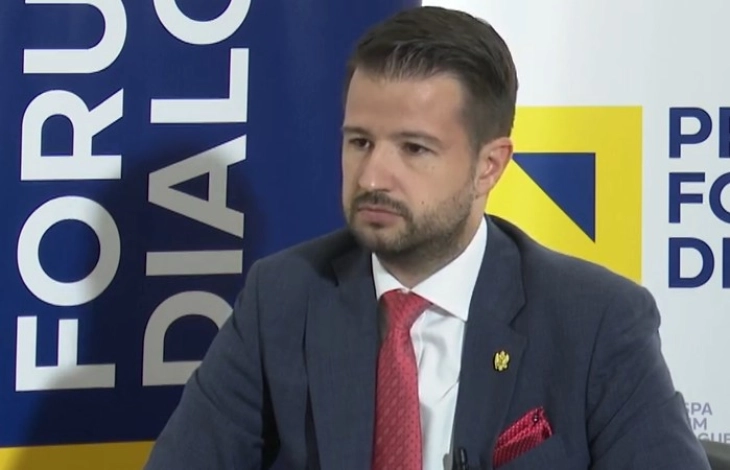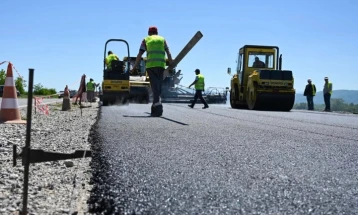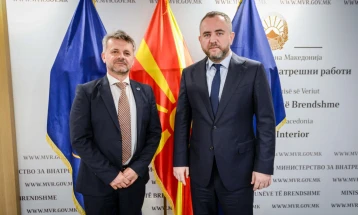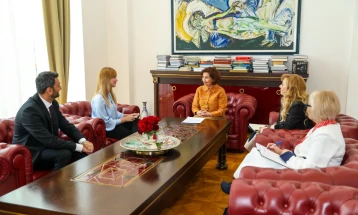Milatović for MIA: I encourage Skopje to adopt constitutional changes
- Montenegro is North Macedonia's great friend and ally on the European path; I encourage the ongoing dialogue on the constitutional changes the country needs to make and I hope you will come out of it a stronger society, newly elected Montenegrin President Jakov Milatovic told MIA in an exclusive interview.
- Post By Magdalena Reed
- 12:16, 16 June, 2023

Struga, 16 June 2023 (MIA) — Montenegro is North Macedonia's great friend and ally on the European path; I encourage the ongoing dialogue on the constitutional changes the country needs to make and I hope you will come out of it a stronger society, newly elected Montenegrin President Jakov Milatovic told MIA in an exclusive interview.
He said the country's significant progress had been recognized by Brussels, which responded by taking the first step of the European Union accession negotiations.
Montenegro's early parliamentary election winner is the Movement Europe Now, which you co- founded. Your party will get the mandate to form the government. Considering the election results and the need for a coalition, do you expect a stable government to be formed? Some political analysts say this would be an almost impossible mission and Montenegro may enter a period of political instability.
Milatovic: Montenegrin society has gone through profound changes in the past two or three years. The greatest change was in 2020, when the regime fell. As you know, a government was formed without the previous ruling party. We have had two different governments since and we have surely entered a new democratic developmental stage. An additional step forward was the presidential election, when on April 2 I convincingly defeated the previous president, Milo Djukanovic. So it seems Montenegro has entered a new stage in both its democratic and its economic development.

So it's safe to say the parliamentary election last week was the first one without any pressure, with citizens voting freely. That is a big step forward for Montenegro. It is certainly up to all of us now that Montenegro gets a stable government. It will have an important job: to increase the standard of living of Montenegro citizens; to promote the rule of law; and to really focus on European integration.
What I also said in my presidential campaign was that this is the last train for Montenegro to become a full EU member in the next few years, if we really do what we need to do. This is what the main task of this next government is.
Of course, how stable it will be depends on many things. As President, I hope it will be stable and that its stability and reform capacity will improve things in Montenegro and, together with me in the presidential role, will finally bring the country into the EU.
Podgorica started accession talks with the EU in 2012. You said you believed Montenegro should become an EU member by 2027-28. How realistic is this goal, considering Macron's latest statements and Von der Leyen's four-point plan to bring the Western Balkans closer to the EU?
Milatovic: Right after I became president of Montenegro, I went on my first official visit to Brussels to show my commitment to the European path, both as president and to the new generation of Montenegrin politicians. Brussels responded with encouraging messages, so I think it is the right moment — in the next few months, year or two — for Montenegro to seize and take a major step forward.
Montenegro's entry into the EU is our highest priority. I believe Montenegro's membership is a much bigger deal than Montenegro. It would stringly indicate that enlargement is alive and would be a good signal for all other countries in the Western Balkans. It would be a good signal from Brussels also for Eastern European countries. There is a strong momentum both in Montenegro and in Brussels for this to happen. That's why I think it's real. Of course, we should continue and really tackle some reforms, especially those related to the fight against crime and corruption. There is a strong political will for that in Montenegro now. This parliamentary election, after the presidential one, showed that Montenegro is on the right track, and I am truly optimistic.

North Macedonia has set the goal of full EU membership by 2030, but to continue on this path, it needs to adopt constitutional amendments. How important is it for the country to use this momentum amid the geopolitical circumstances due to the war in Ukraine that have put enlargement back on the EU agenda?
Milatovic: First, I would like to say that Montenegro is a great friend of North Macedonia's. In all Montenegrin decision-makers, you have a strong friend and great ally on the European path. This is the result of a strong closeness between the citizens of Montenegro and the citizens of North Macedonia, which is the basis of everything. We really look forward to North Macedonia's progress on its way to full EU membership. In the transitional period, Macedonia has done a lot. It has taken significant steps forward and it seems to me that Brussels has responded in a good way, giving wind at the back of both North Macedonia and Albania by taking, I daresay, the first step of the negotiations between North Macedonia and the European Commission.
True, the Russian aggression against Ukraine may have even stirred Brussels to start behaving a little more politically toward the enlargement process, and not only technically, as has often been the case so far. It is really important for all our countries from the Western Balkans. This is the fundamental change that happened in the past year – Brussels realized that the Western Balkans need a political flywheel. Montenegro has made the most progress on this path, which is why I think our full membership would provide a strong wind at the back of all other Western Balkan countries, above all, North Macedonia.
I encourage the dialogue that currently exists in North Macedonia on the constitutional changes the country needs to make. I hope you will come out of it even stronger as a society and I indeed support the efforts of all decision-makers in North Macedonia to step toward this European path.

Montenegro is not part of the Open Balkan Initiative, which is considered to be the most prominent initiative for regional integration. In June the World Bank said the initiative had savings of EUR 3 billion. You already said that Montenegro should be part of the initiative. When could Podgorica join the Open Balkan?
Milatovic: Before I entered Montenegrin politics, for many years I was an economist at the European Bank for Reconstruction and Development's and from my academic and professional background, I really am a strong supporter of regional economic integration. I believe we are a region that is focused on our economic relations, and any economic integration in the region is a good step forward.
In terms of regional integration we often forget that European integration is what is on the other side of the coin, more specifically that regional economic integration is the basis for European integration. The EU story began as a story for regional economic integration between France, Germany, Italy and the Benelux countries. I believe that is something the Western Balkans cannot forget. In that sense, the Central European Free Trade Agreement (CEFTA), the Berlin Process and other regional economic integrations have achieved a lot.
Even this initiative, which appeared organically in the Western Balkan region — if we put it in the focus of our European path — could also be a good incentive. Of course this issue for Montenegro will be decided by the new Government and Parliament, but a priori, if we as a society see the Open Balkan Initiative as part of our European integration, I think it is a good thing for Montenegro as much as for the Western Balkans.

Given the war in Ukraine and the tensions in Kosovo, do you expect the region to go toward European integration and further stabilization, or toward a possible destabilization and disintegration?
Milatovic: Montenegro is truly a good neighbor and the image, the one of Podgorica on May 20, the day of my inauguration, when all of the leaders of the Western Balkans gathered in Podgorica — though, unfortunately, Pendarovski couldn't attend because he had a meeting scheduled in advance — but the very appearance of the presidents from Serbia, Kosovo, Croatia, Albania and Bulgaria, and the three member-presidents from Bosnia and Herzegovina, that day painted an image of Podgorica of a unified Western Balkans that cooperates and is focused on each of us. I am confident that only the Western Balkans that are part of the EU can be stable and prosperous. That's the politics I promote and believe that is the politics we should all promote together.

In that sense, good neighborly relations are a good addition and are one of the priorities for Montenegro's foreign policy. As President, this is the background of all messages I have sent and will send in the future. I would really want, as I think others in the Western Balkan region would as well, to completely de-escalate all disputes and general disagreements between Belgrade and Prishtina.
I strongly support the dialogue between Belgrade and Prishtina. We are willing to help whoever asks, but a complete normalization of relations between Serbia and Kosovo is a base for a stable and prosperous Western Balkans, which is what we stand for. I think that we are of the same opinion in this issue with the EU, that for reaching de-escalation Kosovo needs to have elections again and that they need to fulfil all preconditions related to the formation of the Community of Serb Municipalities of Northern Kosovo as steps for father de-escalation and whatever else that will lead to that, Montenegro will support. Our position is clear and I think North Macedonia thinks the same. I believe that we really need a prosperous and stable Western Balkans as part of the EU. ssh/mr
Violeta Gerov
Photo: MIA
Video and editing: Aslan Visko







